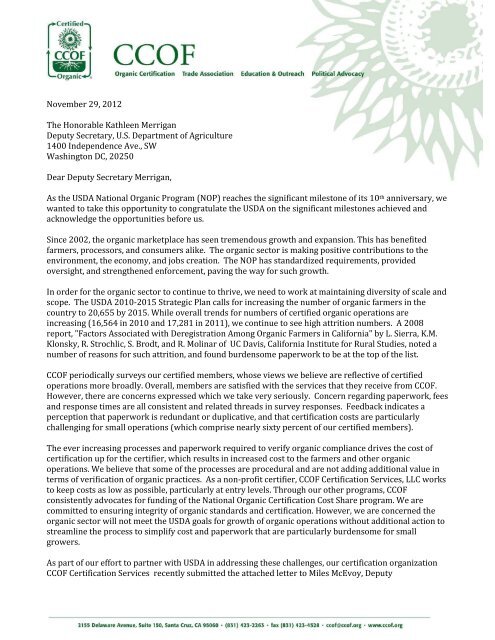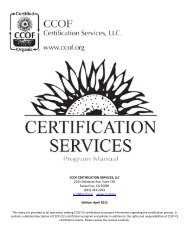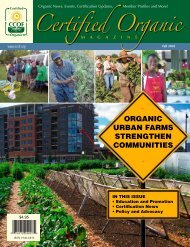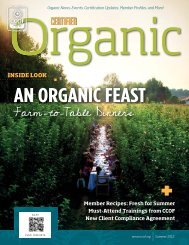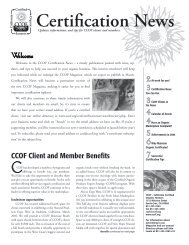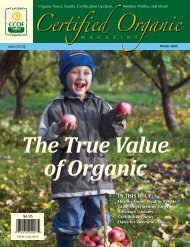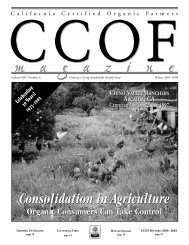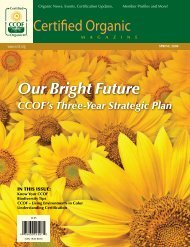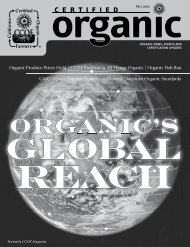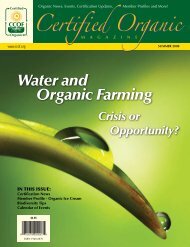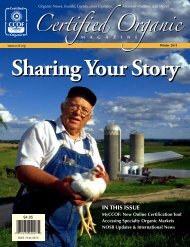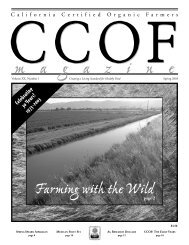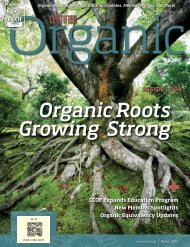CCOF wrote to the USDA
CCOF wrote to the USDA
CCOF wrote to the USDA
- No tags were found...
Create successful ePaper yourself
Turn your PDF publications into a flip-book with our unique Google optimized e-Paper software.
November 29, 2012The Honorable Kathleen MerriganDeputy Secretary, U.S. Department of Agriculture1400 Independence Ave., SWWashing<strong>to</strong>n DC, 20250Dear Deputy Secretary Merrigan,As <strong>the</strong> <strong>USDA</strong> National Organic Program (NOP) reaches <strong>the</strong> significant miles<strong>to</strong>ne of its 10 th anniversary, wewanted <strong>to</strong> take this opportunity <strong>to</strong> congratulate <strong>the</strong> <strong>USDA</strong> on <strong>the</strong> significant miles<strong>to</strong>nes achieved andacknowledge <strong>the</strong> opportunities before us.Since 2002, <strong>the</strong> organic marketplace has seen tremendous growth and expansion. This has benefitedfarmers, processors, and consumers alike. The organic sec<strong>to</strong>r is making positive contributions <strong>to</strong> <strong>the</strong>environment, <strong>the</strong> economy, and jobs creation. The NOP has standardized requirements, providedoversight, and streng<strong>the</strong>ned enforcement, paving <strong>the</strong> way for such growth.In order for <strong>the</strong> organic sec<strong>to</strong>r <strong>to</strong> continue <strong>to</strong> thrive, we need <strong>to</strong> work at maintaining diversity of scale andscope. The <strong>USDA</strong> 2010-2015 Strategic Plan calls for increasing <strong>the</strong> number of organic farmers in <strong>the</strong>country <strong>to</strong> 20,655 by 2015. While overall trends for numbers of certified organic operations areincreasing (16,564 in 2010 and 17,281 in 2011), we continue <strong>to</strong> see high attrition numbers. A 2008report, "Fac<strong>to</strong>rs Associated with Deregistration Among Organic Farmers in California" by L. Sierra, K.M.Klonsky, R. Strochlic, S. Brodt, and R. Molinar of UC Davis, California Institute for Rural Studies, noted anumber of reasons for such attrition, and found burdensome paperwork <strong>to</strong> be at <strong>the</strong> <strong>to</strong>p of <strong>the</strong> list.<strong>CCOF</strong> periodically surveys our certified members, whose views we believe are reflective of certifiedoperations more broadly. Overall, members are satisfied with <strong>the</strong> services that <strong>the</strong>y receive from <strong>CCOF</strong>.However, <strong>the</strong>re are concerns expressed which we take very seriously. Concern regarding paperwork, feesand response times are all consistent and related threads in survey responses. Feedback indicates aperception that paperwork is redundant or duplicative, and that certification costs are particularlychallenging for small operations (which comprise nearly sixty percent of our certified members).The ever increasing processes and paperwork required <strong>to</strong> verify organic compliance drives <strong>the</strong> cost ofcertification up for <strong>the</strong> certifier, which results in increased cost <strong>to</strong> <strong>the</strong> farmers and o<strong>the</strong>r organicoperations. We believe that some of <strong>the</strong> processes are procedural and are not adding additional value interms of verification of organic practices. As a non-profit certifier, <strong>CCOF</strong> Certification Services, LLC works<strong>to</strong> keep costs as low as possible, particularly at entry levels. Through our o<strong>the</strong>r programs, <strong>CCOF</strong>consistently advocates for funding of <strong>the</strong> National Organic Certification Cost Share program. We arecommitted <strong>to</strong> ensuring integrity of organic standards and certification. However, we are concerned <strong>the</strong>organic sec<strong>to</strong>r will not meet <strong>the</strong> <strong>USDA</strong> goals for growth of organic operations without additional action <strong>to</strong>streamline <strong>the</strong> process <strong>to</strong> simplify cost and paperwork that are particularly burdensome for smallgrowers.As part of our effort <strong>to</strong> partner with <strong>USDA</strong> in addressing <strong>the</strong>se challenges, our certification organization<strong>CCOF</strong> Certification Services recently submitted <strong>the</strong> attached letter <strong>to</strong> Miles McEvoy, Deputy
Administra<strong>to</strong>r of <strong>the</strong> NOP, outlining some of our recommendations on how <strong>the</strong> NOP can work withcertifiers <strong>to</strong> increase <strong>the</strong> focus on organic practices while decreasing <strong>the</strong> emphasis on paperwork.Our suggestions included:1. Support Practices Not Paperwork in Instructions <strong>to</strong> Certifiers2. Support Operations Responding <strong>to</strong> Onsite Situations3. Support Use of Tools o<strong>the</strong>r than Noncompliance4. Support Updates <strong>to</strong> OSP During Inspection5. Support Certifier Assistance in Completing & Modifying OSP6. Support and Encourage Electronic Documentation Systems7. Support Simplified Continuation of Certification Processes8. Support Collaboration Between Certified Operations and Certifiers9. Discourage Reliance on “Described in <strong>the</strong> OSP”10. Support Increased Inspec<strong>to</strong>r QualityWe hope you will encourage and support <strong>the</strong> NOP in moving <strong>to</strong>ward implementing <strong>the</strong>seimprovements.Looking <strong>to</strong> 2013 and beyond, we would also like <strong>to</strong> continue working with <strong>the</strong> <strong>USDA</strong> on <strong>the</strong> followinggoals for organic producers and handlers <strong>to</strong> be more competitive in <strong>to</strong>day’s marketplace.1. Keeping organic relevant. The organic seal must remain <strong>the</strong> “gold standard” among <strong>the</strong>increasing array of competing labels. In order <strong>to</strong> do this, we need <strong>to</strong> make sure <strong>the</strong> philosophy ofcontinuous improvement remain an integral aspect of organic standards. Organic standardsshould be expanded <strong>to</strong> address broader issues of sustainability (energy efficiency and renewableenergy usage, sustainable packaging, etc.), animal welfare, and social justice. We would alsoencourage <strong>the</strong> agency <strong>to</strong> protect and support <strong>the</strong> organic brand in <strong>the</strong> marketplace.2. Expanding interagency partnerships. Great strides have been made in this area, not <strong>the</strong> least ofwhich is <strong>the</strong> recent Organic Literacy Initiative. The <strong>USDA</strong> should continue <strong>to</strong> offer high levelcoordination among agencies <strong>to</strong> ensure that organic producers receive equal access <strong>to</strong> <strong>USDA</strong>programs and services that will increase <strong>the</strong>ir competitiveness and ensure <strong>the</strong> <strong>USDA</strong> strategic goalof increasing <strong>the</strong> number of certified organic farms in <strong>the</strong> US is met. This includes increasingaccess <strong>to</strong> loans, export assistance, extension, and NRCS cost sharing and technical assistance. Forexample, by creating a formal “transitional” status for organic, <strong>the</strong> NRCS would have a benchmarkfor those wanting <strong>to</strong> use conservation programs <strong>to</strong> transition <strong>to</strong> organic. In addition, interagencysharing of price data could help <strong>to</strong> streng<strong>the</strong>n organic crop insurance coverage. Informationregarding organic compliant and experimental treatments for invasive pests should be regularlyprovided <strong>to</strong> <strong>the</strong> Animal Plant Health Inspection Service (APHIS).3. Promoting public procurement of organic food. The <strong>USDA</strong> should streng<strong>the</strong>n relationshipswith o<strong>the</strong>r federal agencies <strong>to</strong> increase procurements of organic food and ingredients for publicinstitutions such as schools, hospitals, cafeterias and o<strong>the</strong>r facilities with food services.4. Expanding interagency partnerships around food safety. <strong>USDA</strong> should continue <strong>to</strong> work with2
FDA <strong>to</strong> ensure food safety regulations for <strong>the</strong> Food Safety Modernization Act (FSMA) arecompatible with organic farming practices. The <strong>USDA</strong> should provide educational resourcesspecifically <strong>to</strong> assist organic farmers in developing and implementing scale-appropriate foodsafety plans and with resources specifically for organic farmers.5. Preventing GMO contamination. <strong>USDA</strong> should continue and streng<strong>the</strong>n its leadership role inprotecting organic farms from GMO contamination by increasing coordination among agenciesand contributing <strong>to</strong> policy solutions. We believe that research in co-existence approaches andseed supply, such as <strong>the</strong> priorities identified in <strong>the</strong> AC21 recommendations, are particularly ripefor agency coordination.6. Updating <strong>the</strong> Organic Food Production Act (OFPA). The NOP should periodically review OFPAand make recommendations <strong>to</strong> Congress regarding necessary revisions, particularly related <strong>to</strong>any obstacles <strong>to</strong> maintaining organic as a gold standard while ensuring <strong>the</strong> program works forsmall operations. Delay of <strong>the</strong> 2012 Farm Bill may offer an opportunity for consideration ofrecommendations beyond needed enforcement authority.There is no question that in this economy <strong>the</strong>re are many opportunities for <strong>the</strong> public sec<strong>to</strong>r <strong>to</strong> invest <strong>to</strong>create growth and efficiency in <strong>the</strong> organic sec<strong>to</strong>r. Continued rapid growth of <strong>the</strong> organic sec<strong>to</strong>r – evenduring economically challenging times and with relatively little direct financial support from <strong>the</strong> publicsec<strong>to</strong>r—demonstrates that <strong>the</strong>re is vast opportunity <strong>to</strong> provide consumers with more agricultural choiceswhile creating jobs and promoting environmental sustainability.<strong>CCOF</strong> Direc<strong>to</strong>r of Policy and Programs Brise Tencer and I look forward <strong>to</strong> <strong>the</strong> continued partnership with<strong>USDA</strong> <strong>to</strong> achieve <strong>the</strong>se goals.Thank you for consideration.Sincerely,Cathy CalfoExecutive Direc<strong>to</strong>r/CEOCC:Mark Lipson, Organic and Sustainable Agriculture Policy AdvisorMiles McEvoy, National Organic Program Deputy Administra<strong>to</strong>rEnclosure: <strong>CCOF</strong> Letter <strong>to</strong> NOP- Practices Not Paper3


